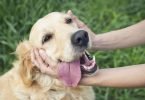Like humans, dogs can be a patient of hernias. Theoretically, inside the body, when the area coverage for internal organs is not able to hold it properly, the relevant organ bumps through the place. As a result, the wall of tissues may tear away. A hernia is a tear in the body wall of the organ muscles. These muscles permit the organs in the abdominal areas to push through the weak spots relentlessly. However, the most common type of hernias is a canine umbilical hernia.
In most cases, your puppy can be fully recovered from hernias. Nevertheless, some hernias can endanger the canine life. In this article, we will mostly focus on a canine umbilical hernia.
Types of canine umbilical hernia
The gravity of hernia varies depending upon the size of the hole on the abdominal wall. In the initial stage, little quantity of fat from the abdomen occasionally can pop out from the gap. However, you can simply put it back by pressuring a little.
In the following chart, we will provide a short idea about the types of dog hernia.
Types of hernia | Short notes |
Inguinal hernia | Inguinal canal in dogs is the source of inguinal hernia. It happens when there is a hole in the genital area. |
Hiatal hernia | The hiatus is a hole in the diaphragm. If the opening gets bigger than its actual size, the stomach will bump through the chest hole. |
Diaphragmatic hernia | Inborn defects, injury and mental distress in puppies can cause two types of diaphragmatic hernia. |
Umbilical hernia | If the umbilical cords in puppies do not close immediately after birth, it can leave a hole. In that way, it can lead to umbilical hernia. |
Source 1 – https://m.petmd.com/dog/general-health/hernias-puppies-what-you-need-know
Causes of puppy umbilical hernia
An umbilical hernia frequently occurs in dogs. There are two reasons behind canine umbilical hernias. It may be a inborn disease. Additionally, a specific injury can cause a hernia in dogs.
Congenital cause
The congenital cause is the most normal reason for an umbilical hernia. Behind the inborn issue, genetic disposition may be responsible. Otherwise, impulsive conditions of physical development can affect the exposure of hernias.
Certain physical and mental cause
Distress, injury, aging can create scratch of the internal body wall. Thus, this condition allows the organs to cause a hernia.
Symptoms of puppy umbilical hernia
Umbilical hernias can be temporary and serious types. The temporary hernias cause a soft bump in the umbilical area. It does not show for a long time. Also, it can be of different sizes. Conversely, there is a complicated version of umbilical hernia. This type of hernia contains a filling of abdominal cavities. It shows severe symptoms and illnesses in dogs.
The common symptoms of umbilical hernia in puppies are –
- Presence of spongy lump at the umbilical spot
- Visible Growth of the lump after several days
- Increased body temperature on the lump area
- Severe pain in case of a large hernia
- Vomiting
- Gloominess and lethargy
- Unwillingness to eat
- extreme inflammation of the hernia
- Mild to high fever
It is necessary to take emergency steps for the treatment of your puppy. Otherwise, kidney and liver failure can occur. Moreover, in the worst-case scenario, it can die within 24- 48 hours.
Treatment and surgery for canine umbilical hernia
Diagnosis
Normally, the diagnosis of the soreness and swelling of hernia is necessary. Your veterinarian can give some physical tests. Accordingly, X-ray and USG (ultrasonogram) of the lower abdomen or abdomen may be required.
Treatment
Some temporary occurrence of umbilical hernia may heal without any particular treatment. However, its severity varies from one to another. If the size of the hernia is small, then your vets will not advise for surgery may be. Nevertheless, larger hernias need surgical adjustment.
Surgery and cost for canine umbilical hernia
According to the report of VCA Hospitals,
- Hernias that are less than 1 cm may instinctively heal. It usually takes around four months of age of your puppy.
- If the condition does not improve within that period, surgery is required.
- Your surgeon can do the hernia surgery of your dog along with spay. Often the hernia surgery cost is included in the neuter or spay with an additional charge of $100 to $200.
- Sometimes the pet owners decide to schedule the sterilization and hernia surgery separately. In that case, the maximum cost will be around $400. However, that cost is for healthy dogs.
- If the illness increases and you need the dog’s surgery immediately, you need to pay $500 to $1000. The cost may increase depending upon the severity of canine health conditions.
To know vets’ suggestion on this topic, you can watch the video.
Post-surgery instruction
If your puppy has a sterilization surgery, you need to be very careful. Often after hernia surgery or after spay, your puppy does not let the wound heal properly. It frequently tries to touch the wound. This activity may damage the sutures. Sometimes, your puppy even scratches it in case of any irritation or itching.
E-Collar Alternative Cats Dogs
In that case, we recommend E-Collar Alternative Cats Dogs. It is a support belt for your pet’s wound protection. This belt is specially designed for post-surgery care of your pet. Besides, it comes with different suitable sizes.
Pros
- Recommended by veterinarians
- Hypoallergenic and light fabric
- Prevents skin irritation
Cons
- It may be uncomfortable for some pups.
Dog hernia after spay
If your dog has not suffered from a hernia and has been spayed already, you may think that the chances are zero. However, dogs can be affected by umbilical hernia even after spay. After the sterilization process, hernias can occur. If your dog has an inappropriate curative process, hernias can be the consequence.
Sometimes, the canine goes beyond its ability. It can reduce the chances of healing properly. Moreover, if the surgery stitches tear by any chance, it may be fatal. Thus, there can be a potential risk of umbilical hernias in dogs.
About buying a puppy with an umbilical hernia
As a pet owner, you may be worried about having a dog with a hernia. If you have plans for hernia surgery along with spay, then there is no need to worry.
However, problems can occur if you want to breed the dog. As I have mentioned earlier, umbilical hernia or any other hernia can be genetic. That is why; breeding should not be your prior option while raising dogs with hernias. Moreover, if you want to give it to any other breeders, you should not conceal its medical and genetic history.
Natural remedy for canine umbilical hernia
CBD oil
Normally, there is not a lot of natural remedy for dog hernias. Inborn umbilical hernias cannot be treated with specific natural remedies. However, veterinarians typically recommend CBD oil. It is also beneficial for the treatment of canine skin problems.
Recommended Dosage of CBD oil
According to your pet’s weight, you can decide the dose. Vets usually suggest 0.5 to 5 mg CBD for every ten pounds of weights. Still, you should be careful about the overdose of any medicine. It does not matter whether it is natural or not. If you want to use it as a pain reducer, once or twice per day with an interval of 8 hours, should be okay. However, veterinarian supervision is highly needed for this purpose.
Prevention of canine umbilical hernia
You cannot predict the possibility of congenital hernias. Some breeds like Shar-Peis, English Bulldogs are more susceptible to hiatal hernia. Also, Weimaraners suffer from diaphragmatic hernias rather than other breeds. However, you can prevent the inborn hernias. It is possible by dropping the breeding activities of hernia-affected dogs.
Quick diagnosis and treatment involvement can prevent further complications. Consult your vet whenever you notice any unusual lump on your pet. Even if your puppy does not complain about the pain, it is indeed crucial. Because most of the time, hernias do not occur any pain at the primary stage. Hence, precaution is the best solution for this medical urgency.
Conclusion
Canine hernia problem can be very upsetting and painful for your dog. However, it is not life-threatening for your puppy as long as you are concerned. It is necessary to make regular appointments with your pet doctor. Routine check-ups and proper care after birth can decrease the chance of canine umbilical hernia significantly.
Ensure a healthy diet and lifestyle for your puppy. Moreover, be cautious about any kind of accidents or traumas. Furthermore, you should provide extra post-surgery nursing to your pet. Good health condition will keep away additional complexity or reoccurrence of the hernia.






